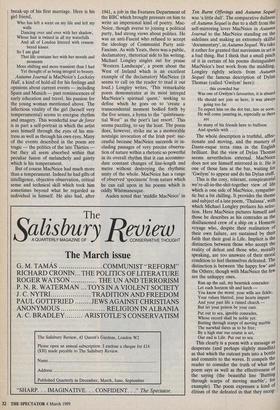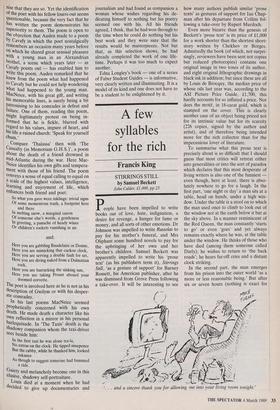Who has left a scent on my life and left
my walls Dancing over and over with her shadow, Whose hair is twined in all my waterfalls And all of London littered with remem- bered kisses.
So I am glad That life contains her with her moods and moments More shifting and more transient than I had Yet thought of as being integral to beauty.
Autumn Journal is MacNeice's Locksley Hall, a kind of hold-all for his feelings and opinions about current events — including Spain and Munich — past reminiscences of early education and travel, his passion for the young woman mentioned above. The infectious vitality of the girl (herself very temperamental) seems to energise rhythm and imagery. This wonderful tour de force is in part a self-portrait in which the artist sees himself through the eyes of his mis- tress as well as through his own eyes. Many of the events described in the poem are tragic — the politics of the late Thirties but they all seem absorbed within that peculiar fusion of melancholy and gaiety which is his temperament.
But of course MacNeice had much more than a temperament. Indeed he had gifts of intelligence, objective observation, critical sense and technical skill which took him sometimes beyond what he regarded as individual in himself. He also had, after 1941, a job in the Features Department of the BBC which brought pressure on him to write an impersonal kind of poetry. Mac- Neice, though averse to joining a political party, had strong views about politics. He was an anti-Fascist who refused to accept the ideology of Communist Party anti- Fascism. As with Yeats, there was a public, declamatory, rhetorical side to his writing. Michael Longley singles out for praise `Western Landscape', a poem about the West of Ireland which is an excellent example of the declamatory MacNeice (it seems to call on the reader to read it out loud.) Longley writes, 'This remarkable poem demonstrates at its most intrepid MacNeice's spiritual quest,' seeking to define which he goes on to 'create a transcendental moment bodied forth by the five senses, a hymn to the "quintessen- tial West" as the poet's last resort.' This seems puzzling, to say the least. The poem does, however, strike me as a memorable nostalgic invocation of the Irish past: suc- cessful because MacNeice succeeds in in- cluding passages of very precise observa- tion of nature within a rhetoric so powerful in its overall rhythm that it can accommo- date constant changes of line-length and metre without destroying the rhythmic unity of the whole. MacNeice has a range of observed 'specimens' from nature which he can call upon in his poems which is oddly Whitmanesque.
Auden noted that 'middle MacNeice' in Ten Burnt Offerings and Autumn Sequel was 'a little dull'. The comparative dullness of Autumn Sequel is due to a shift from the self-mirroring lover MacNeice in Autumn Journal to the MacNeice standing on the sidelines and making an extremely skilful `documentary', in Autumn Sequel. We take it rather for granted that narcissism in art is a bad thing. But I think that a small pinch of it in certain of his poems distinguishes MacNeice's best work from the middling. Longley rightly selects from Autumn Sequel the famous description of Dylan Thomas (called `Gwilym' here): . . this crowded bar
Was one of Gwilym's favourites, it is absurd He should not join us here, it was always going too far To expect him on the dot but, late or soon, He will come jaunting in, especially as there are So many of his friends here to buffoon And sparkle with . .
The whole description is truthful, affec- tionate and moving, and the mastery of Dante-esque term rima in the English brilliant. But the view of Dylan Thomas seems nevertheless external. MacNeice does not see himself mirrored in it. He is one of those fans at the bar, waiting for `Gwilym' to appear and do his Dylan stuff This is the cosy, tolerant, conspiratorial we're-all-in-the-shit-together view of life which is one side of MacNeice, sympathe- tic but a bit chilling. It provides the theme and subject of a late poem, `Thalassa', with which Michael Longley prefaces his selec- tion. Here MacNeice pictures himself and those he describes as his comrades as the disillusioned crew of a ship on a Homeric voyage who, despite their realisation of their own failure, are sustained by their faith that their goal is Life. Implicit is the distinction between those who accept the reality of defeat and those who, morally speaking, are too unaware of their moral condition to feel themselves defeated. The distinction is between 'the happy few' and the Others; though with MacNeice the few are the unhappy ones.
Run up the sail, my heartsick comrades: Let each horizon tilt and lurch -
You know the worst: your wills are fickle, Your values blurred, your hearts impure And your past life a ruined church - But let your poison be your cure.
Put out to sea, ignoble comrades, Whose record shall be noble yet: Butting through scarps of moving marble The narwhal dares us to be free; By a high star our course is set, Our end is Life. Put out to sea.
This clearly is a poem with a message as desperate (and perhaps slightly maudlin) as that which the outcast puts into a bottle and commits to the waves. It compels the reader to consider the truth of what the poem says as well as the effectiveness of the saying (the beautiful line 'Butting through scarps of moving marble', for example). The poem expresses a kind of elitism of the defeated in that they recog- vise that they are so. Yet the identification of the poet with his fellow losers-out seems questionable, because the very fact that he has written the poem demonstrates his superiority to them. The poem is open to the objection that Auden made to a poem by Cavafy in which the poet nostalgically remembers an occasion many years before on which he shared great sensual pleasure with a young man in an Alexandrian brothel, a scene which years later — as Cavafy points out — has enabled him to write this poem. Auden remarked that he knew from the poem what had happened to Cavafy but he could not help wondering what had happened to the young man. MacNeice, with his great gift, and writing his memorable lines, is surely being a bit patronising to his comrades in defeat and failure. One of them, reading this poem, might legitimately protest on being in- formed that he is fickle, blurred with regard to his values, impure of heart, and his life a ruined church: 'Speak for yourself chum.'
Compare `Thalassa' then with 'The Casualty (in Memoriam G.H.S.)', a poem about the death of a friend drowned in Mid-Atlantic during the war. Here Mac- Neice identifies his own gifts and tempera- ment with those of his friend. The poem conveys a sense of equal calling to equal on a scale of the highest values, intelligence, learning and enjoyment of life, which enhances both friend and poet:
So what you gave were inklings: trivial signs Of some momentous truth, a footprint here and there In melting snow, a marginal caress Of someone else's words, a gentleness In greeting, a panache of heady wines Or children's rockets vanishing in air.
and:
Here you are gabbling Baudelaire or Donne, Here you are mimicking that cuckoo clock, Here you are serving a double fault for set, Here you are diving naked from a Dalmatian rock, Here you are barracking the sinking sun, Here you are taking Proust aboard your doomed corvette.
The poet is involved here as he is not in his description of Gwilym or with his desper- ate comrades.
In his last poems MacNeice seemed Prophetically concerned with his own death. He made death a character like his own reflection in a mirror in his personal harlequinade. In 'The Taxis' death is the shadowy companion whom the taxi-driver sees beside him:
In the first taxi he was alone tra-la, No extras on the clock. He tipped ninepence But the cabby, while he thanked him, looked askance As though to suggest someone had bummed a ride.
Gaiety and melancholy become one in this elusive, shadowy self-portraiture. Louis died at a moment when he had decided to give up documentaries and journalism and had found as companion a woman whose wishes regarding his de- dicating himself to nothing but his poetry seemed one with his. All his friends agreed, I think, that he had won through to the time when he could do nothing but his best work and they were sure that the results would be masterpieces. Not but that, as this selection shows, he had already completed the work of one life- time. Perhaps it was too much to expect another.
Edna Longley's book — one of a series of Faber Student Guides — is informative, very clearly written and illuminating. It is a model of its kind and one does not have to be a student to be enlightened by it.

















































 Previous page
Previous page